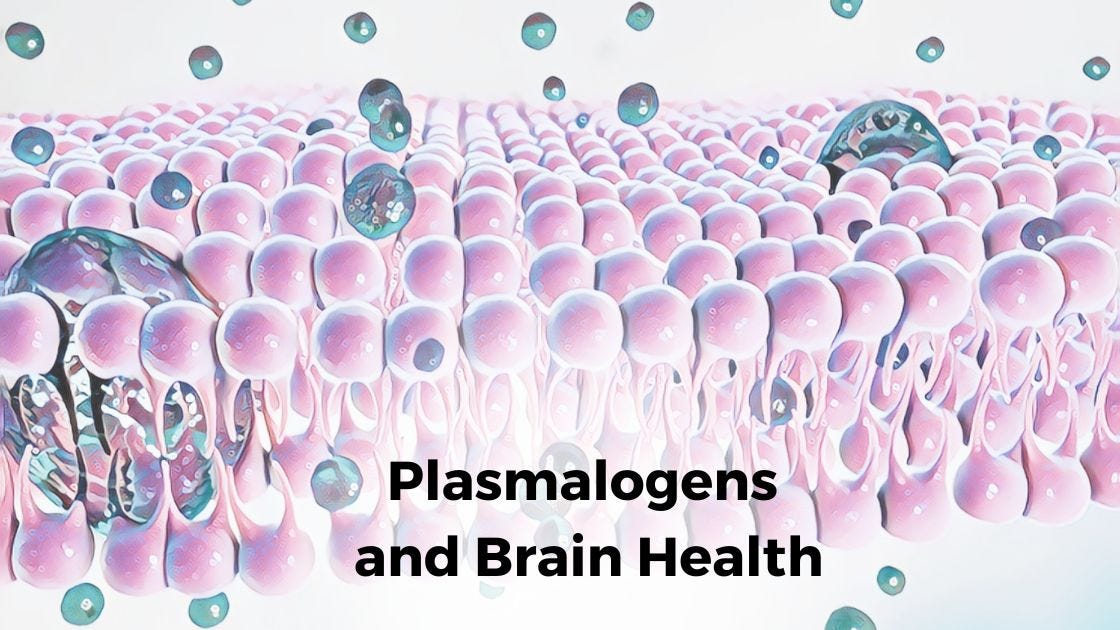Brain health, preventing dementia, and plasmalogens
Plasmalogens are an essential part of brain health
Hi there,
I'm amazed at all the ways our body has to fight off disease and maintain health. This week's new article zooms in on an integral part of brain health - plasmalogens.
Each cell, including neurons in the brain, is encased in a lipid membrane. The cell membrane is dynamic and made up mainly of phospholipids, with other lipids and proteins interspersed. Pasmalogen, a specific type of phospholipid, makes up around 20% of the cell membrane in healthy brain cells.
Plasmalogens are essential in brain health in a couple of ways:
1) They enhance the cell membrane's fluidity, which allows for easy release of vesicles that contain neurotransmitters
2) They can act as antioxidants to neutralize oxidative stress
Various factors, including mitochondrial dysfunction, infections, autoimmune diseases, environmental toxins, iron accumulation, and the natural aging process, can lead to excessive oxidative stress in the brain. While cellular antioxidant systems prevent oxidative stress in many circumstances, plasmalogens shield neurons by neutralizing reactive oxygen species and oxidized lipids.
As you'll see from the article, very low plasmalogen levels are found in Alzheimer's patients, as well as in other neurodegenerative diseases and ME/CFS.
There's a lot of current research exploring the use of plasmalogen supplements for neurodegenerative diseases. Essentially, this may be a way to restore resiliency in the brain, especially when coupled with other ways of reducing oxidative stress in the brain.
Maintaining brain health is essential, whether you're currently managing a neurodegenerative disease or simply wanting to prevent it from happening in the future.
Gratefully yours,
Debbie
Plasmalogens: Healthy Brain Aging and More
Key takeaways:
~ Plasmalogens are a type of phospholipid that make up cell membranes and can act as an antioxidant to neutralize oxidative stress.
~ Chronic oxidative stress can decrease plasmalogen levels in the brain.
~ Research suggests that plasmalogen depletion plays a causal role in Alzheimer’s disease and other neurodegenerative disorders.
~ Restoring plasmalogen levels shows promise in preventing or reversing neurological disorders.
What are plasmalogens?
Plasmalogens are a unique type of phospholipid and an essential component of cell membranes. Unlike typical phospholipids, plasmalogens have distinctive structural and functional characteristics that make them important in various biological processes.
Essentially, plasmalogens are made up of fatty acids along with a phosphate group, with chemical bonds that make them more flexible. The membrane surrounding each cell is composed of phospholipids, some of which are rigid due to their composition, and then plasmalogens, which are more flexible. Plasmalogens contain polyunsaturated fatty acids such as DHA.
In this article, I’ll focus primarily on the essential function of plasmalogens in the brain. Recent research shows that plasmalogens, or the lack of plasmalogens, likely play a causal role in neurodegenerative diseases such as Alzheimer’s, Parkinson’s, and MS. I’ll also explain the studies on ME/CFS, long covid, and mood disorders.
I need your help to reach more people!
If you enjoy Genetic LIfehacks' content, please consider telling friends and family about the site. Social media posts by members are awesome, or simply share this email with someone you know.
What I've been reading:
People who don't produce lactase as an adult are usually able to consume some dairy because their gut microbes can break down the lactase. In people who don't produce lactase, milk intake is associated with a lower risk of type 2 diabetes. This new study showed that lactase-deficient people who drink some milk have positive changes to the microbiome, in terms of protection from diabetes. Because the lactose isn't broken down by lactase in the intestine, it is available to feed beneficial bacteria in the colon.
Related article: Check your LCT gene here.
The headlines about this study are fabulous -- Oreos are better than statins! The case study explains that in a healthy male with high cholesterol on a ketogenic diet, eating Oreos (or any carbohydrates) will quickly return cholesterol to normal. The point of the study is that a subset of metabolically healthy people will have cholesterol levels rise when doing a keto diet. In this case study, the individual's LDL cholesterol was in the high 300s while on a ketogenic diet, but dropped to around 100 after two weeks of eating 100g of extra carbs (12 Oreos) per day.





